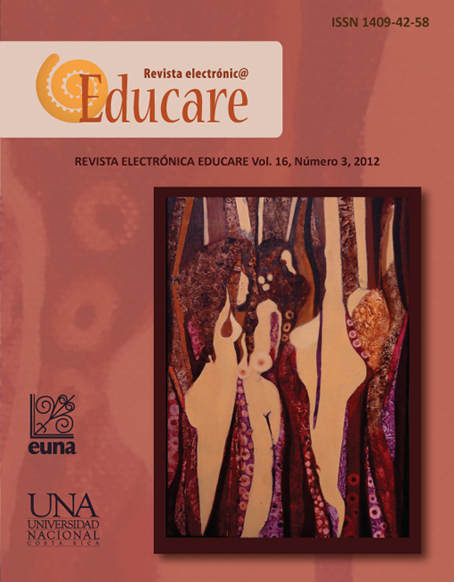Rural Participation in the Territorial Development Processes
DOI:
https://doi.org/10.15359/ree.16-3.5Keywords:
Rural education, participation, quality of life, rural development, knowledge dialogue.Abstract
This paper discusses the urgency of creating a bridge between social participation and civic capacity building. The permanent dialogue between expert and local knowledge should sustain significant, relevant learning processes from/to the rural areas of the Central American region. Consistency and persistence of these processes will enhance human welfare based on the changes experienced in the rural areas. Numerous Central American initiatives require effective social and institutional participation to be implemented. Education, in its different forms and through its different resources, has the crucial responsibility of helping citizens to take advantage of those initiatives.
References
Céspedes, É. (2000). Estudiar mejor en la modalidad presencial y a distancia 1. Guía didáctica.
Heredia, Costa Rica: Universidad Nacional y Universidad Ultrech.
De Souza, J. (2005). El poder de las redes y las redes de poder. Paradigmas emergentes para
transformar la morfología social de sociedades y organizaciones en el contexto del cambio de
época. San José, Costa Rica. Recuperado de http://es.scribd.com/doc/57211488/El-poderde-las-redes-y-las-redes-del-poder-Jose-de-Souza-Silva
Estrategia centroamericana de desarrollo rural territorial 2010-2030: ECADERT/ CAC, ECADERT,
SICA. (2010). San José, Costa Rica: IICA. Recuperado de http://www.magfor.gob.ni/
descargas/planes/ECADERT.pdf
Freire, P. (1993). Pedagogía de la esperanza. México: Siglo XXI.
Freire, P. (2002). La educación como práctica de libertad. México: Siglo XXI.
Gadotti, M. (noviembre-diciembre, 1998). Pedagogía de la tierra y cultura de la sustentabilidad.
Conferencia Continental de las Américas. Cuiabá, Matto Grosso: Consejo de la Tierra.
Grain. (marzo, 2010). Land Grabbing in Latin American [Apropiación de Tierras en América
Latina]. Recuperado de http://www.grain.org/article/entries/3995-land-grabbing-inlatin-america
Grain. (febrero, 2012). Grain releases data set with 4000 global land grabs [Grain publica un
conjunto de datos sobre la apropiación global de 4000 terrenos]. Recuperado de http://
www.grain.org/article/entries/4479-grain-releases-data-set-with-over-400-global-landgrabs
Huanacuni, F. (2010). Buen vivir/vivir bien. Filosofía, políticas, estrategias y experiencias regionales
andinas. Perú: Coordinadora Andina de Organizaciones Indígenas (CAOI).
Instituto Interamericano de Cooperación para la Agricultura (IICA) y Dirección de Desarrollo
Rural Sostenible. (2000). Nueva ruralidad (Serie: Documentos Conceptuales). San José,
Costa Rica: IICA.
Instituto Interamericano de Cooperación para la Agricultura (IICA). (s. f.). Preguntas frecuentes
sobre seguridad alimentaria. Costa Rica: Autor. Recuperado de http://www.iica.int/Esp/
conocimiento/actualidad/Documentos%20Seguridad%20Alimentaria/Preguntas%20
frecuentes%20sobre%20la%20seguridad%20alimentaria.pdf
Kliksberg, B. (domingo 13 de noviembre de 2011). ¿Cómo enfrentar la pobreza y la desigualdad?
(Economistas ortodoxos en aprietos. El capital social se puso en marcha). Biblioteca
Bernardo Kliksberg. Página 12, Suplemento especial, pp. I-IV. Recuperado de http://www.
pagina12.com.ar/especiales/archivo/bernardo_kliksberg/007-KLIKSBERG.pdf
Núñez, C. (enero-abril, 2005). Educación popular: Una mirada de conjunto. Decisio Educación
Popular, 10. http://tariacuri.crefal.edu.mx/decisio/d10/sab1-3.php#inicio
Ortiz, I. y Cummins, M. (2011). Global Inequality: Beyond the Bottom Billion. A Rapid Review of
Income Distribution in 141 Countries. New York: United Nations Children’s Fund (UNICEF).
Recuperado de http://papers.ssrn.com/sol3/papers.cfm?abstract_id=1805046
Rodríguez, M. L. (2004). La teoría del aprendizaje significativo. En A. J. Cañas, J. D. Novak y F.
M. González (Eds.), Concept Maps: Theory, Methodology, Technology (Proc. of the First Int.
Conference on Concept Mapping, pp. 1-10). Pamplona.
Soberanía Alimentaria. (s. f.). ¿Qué es la soberanía alimentaria? Recuperado de http://www.
soberaniaalimentaria.net/definicion.php
Downloads
Published
How to Cite
Issue
Section
License
1. In case the submitted paper is accepted for publication, the author(s) FREELY, COSTLESS, EXCLUSIVELY AND FOR AN INDEFINITE TERM transfer copyrights and patrimonial rights to Universidad Nacional (UNA, Costa Rica). For more details check the Originality Statement and Copyright Transfer Agreement
2. REUTILIZATION RIGHTS: UNA authorizes authors to use, for any purpose (among them selfarchiving or autoarchiving) and to publish in the Internet in any electronic site, the paper´'s final version, both approved and published (post print), as long as it is done with a non commercial purpose, does not generate derivates without previous consentment and recognizes both publisher's name and authorship.
3. The submission and possible publication of the paper in the Educare Electronic Journal is ruled by the Journal’s editorial policies, the institutional rules of Universidad Nacional and the laws of the Republic of Costa Rica. Additionally, any possible difference of opinion or future dispute shall be settled in accordance with the mechanisms of Alternative Dispute Resolution and the Costa Rican Jurisdiction.
4. In all cases, it is understood that the opinions issued are those of the authors and do not necessarily reflect the position and opinion of Educare, CIDE or Universidad Nacional, Costa Rica. It is also understood that, in the exercise of academic freedom, the authors have carried out a rogorous scientific-academic process of research, reflection and argumentation thar lays within the thematic scope of interest of the Journal.
5. The papers published by Educare Electronic Journal use a Creative Commons License:















 The articles published by Educare Electronic Journal can be shared with a Creative Commons License:
The articles published by Educare Electronic Journal can be shared with a Creative Commons License: 



